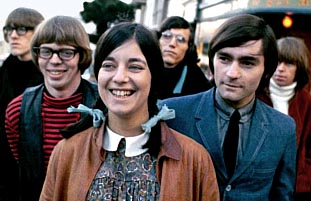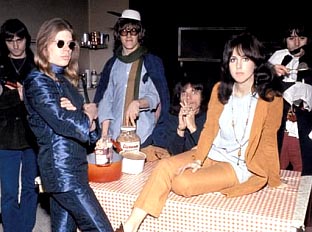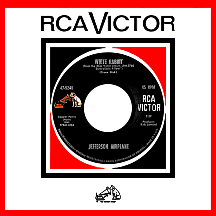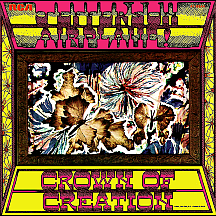JEFFERSON AIRPLANE
Guitarist Jorma Kaukonen and his friend's younger brother Jack Casady started a rock and roll band around 1959 in Washington, D.C.; The Triumphs (named after the motorcycle) covered songs by Elvis, Buddy and other acts of the day despite 18-year-old Jorma's preference for pre-World War II blues and 15-year-old Jack's fixation on more recent R&B sounds. In 1960, Jack switched to electric bass (and gained an appreciation for jazz greats like standup bassist Charles Mingus). It was the earliest indication, however impossible to predict, of a San Francisco-based group that would define a trend in late '60s rock inconceivable at that point in time. By mid-decade, a former teen idol wannabe from Cincinnati named Martyn Buchwald, not yet acquainted with the D.C. boys, had a vague idea of what such a band might be capable of. He fell in with a San Fran folkie, Paul Kantner, and the two set about realizing that uncertain plan. The direction became more clear with the addition of singer Grace Slick, whose "trick voice," as Kaukonen later called it, made the difference for this folk-meets-blues-meets-jazz-meets-experimental-rock amalgam that was a big part, if not the beginning, of a movement called psychedelia. Yet in 1965, even the band's weird name, Jefferson Airplane, offered little or no hint as to what the near future beheld.
Buchwald, living in California since high school, had a music-career mindset; while approaching various L.A. record labels in 1962, he got a shot with Challenge Records. His first single was "Nobody But You," a midtempo pop-rock effort produced by studio pro Jimmie Haskell and written by Dave Burgess (whose best-known songs were Margie Rayburn's 1957 hit "I'm Available," "Everlovin'" by Rick Nelson from '61 and several of The Champs' instrumentals). Martyn was christened Marty Balin by label execs; a follow-up, Jerry Fuller's "You Are the One," was backed with "I Specialize in Love," notable because Marty wrote the song (with Harry Collis) and, individual taste notwithstanding, it's the strongest of the four sides he recorded.
Soon afterwards Marty joined a folk group, The Town Criers. After they split up, he sought out backers to help him purchase a bar called the Honeybucket, previously a jazz club on Fillmore in San Francisco, the idea being to have a venue where amateur local rock artists could play. Like-minded volunteers helped renovate the place and Marty began searching for members of his proposed band. Acoustic guitar player Kantner had an early interest in folk music, citing The Weavers and The Kingston Trio, among others, as influences. He hadn't given any thought to performing rock and roll when Balin approached him. Kantner's friend Kaukonen, well past his late-'50s flirtation with rock, had lived in several eastern countries as a result of his father's job with the U.S. State Department. Jorma was exposed to the sitar in Pakistan and the musical styles of several other cultures. Going beyond the early blues, he'd studied the music of 1950s artists like Muddy Waters and Howlin' Wolf and discovered bluegrass along the way. He'd met Kantner while attending Santa Clara University and had more recently played guitar in small nightclubs behind a young Janis Joplin. Balin and Kantner wanted the acoustic-only Kaukonen to consider going electric. He resisted, but the old phrase "Try it, you'll like it!" kicked in. He plugged in an electric guitar and was hooked.
Signe Toly was born in Seattle and raised in Portland. While attending college in San Francisco, she married Jerry Anderson and sang in a few folk clubs with a group called Two Guys and a Girl. Balin, impressed by her bluesy vocal chops, offered her a spot with his guys. Bassist Bob Harvey and drummer Jerry Peloquin were added for no reason other than they were in the vicinity and filled the needed slots. The nightclub was ready to open after several months' work; one of the investors, Matthew Katz, had appointed himself manager of Balin's group, Jefferson Airplane, the name suggested by Kaukonen as a jet age twist on '20s blues singer Blind Lemon Jefferson and agreed upon by the others because it sounded funny. The band played at the opening of the Matrix, as the club was called, on October 13, 1965.
By the time they opened for blues great Lightnin' Hopkins at the Matrix the following month, it was obvious Bob Harvey's bass playing wasn't quite up to snuff. Jack Casady's adolescent obsession with the rhythm and blues he heard late at night on AM radio from as far away as New Orleans had prompted him to sneak into (or sometimes lurk within earshot of) D.C. R&B clubs where some of the hottest '50s stars performed. Jorma, happy with the idea of having a close friend in the band, called Jack and invited him to take Harvey's place. As for Jerry Peloquin, it's been suggested he was asked to leave for being anti-drugs, a stance at odds with the other band members...partiers all. Guitarist Alexander "Skip" Spence of Windsor, Ontario (a suburb of Detroit, but don't say that to a Canadian!) had been playing folk music in some of the S.F. coffee houses. Marty saw him one night and asked if he played drums. Skip was, like, "Why not?" (and you thought Dave Grohl was the only guy who did that!). Peloquin became a co-founder of The New York Electric String Ensemble, a band whose first album was released a few years later on Columbia Records.

The Bay Area buzz ramped up on Jefferson Airplane that fall; in October they appeared at Longshoreman's Hall (on Fisherman's Wharf) with newcomers The Great Society on the same bill. It was the first time the two bands had crossed paths. Bill Graham, a Berlin-born refugee from the Nazis prior to World War II, had arrived in America in 1941 and settled in San Francisco by the early '60s. He began promoting concerts at the Fillmore Auditorium (formerly Majestic Hall) in late 1965 and on December 10, JA and the Great Society played the Fillmore with The Warlocks, an area band that debuted its new name that night: The Grateful Dead. Within a few weeks, Balin's band signed a contract with RCA Victor and began working on debut LP Jefferson Airplane Takes Off. The Great Society had an opportunity to record for the local Autumn label with future Sly and the Family Stone frontman Sylvester Stewart producing (The Beau Brummels had scored three top 40 hits for Autumn and were, up to that time, S.F.'s hottest rock act). In February 1966, "Someone to Love" (the lyrics were actually 'somebody to love'), credited to The Great !! Society !!, was released on Autumn imprint Northbeach Records. It featured the band's soon-to-be female rock superstar.
Chicago-born piano player Grace Barnett Wing was a straitlaced youngster who worked as a model during her teens. At age 21 she married a "normal" guy named Jerry Slick, but couldn't handle the boredom of domestic routine. The Great Society came into existence after she witnessed a Jefferson Airplane set and within a few months her band was performing at some of the same shows. Hubby Jerry wasn't as stiff-collared as one might think...he drummed for the band. His brother, Darby Slick, played lead guitar (The Slick Family Band!...or just the Slicks!), while rhythm guitarist David Minor and bassist Bard Du Pont rounded out the lineup; Peter Van Gelder later took Bard's place. Also in February, Jefferson Airplane put out its first single, "It's No Secret," with lead singer Balin, who also penned the tune. It failed to hit the charts.
Bill Graham began booking the 'Plane more frequently at the Fillmore. Second single "Blues From an Airplane" also stiffed. Spence skipped out about this time (he had an agenda). Matthew Katz approached New York-born Spencer Dryden, who'd grown up in L.A. and was drumming for The Ashes (later known as The Peanut Butter Conspiracy), and offered an audition, which he passed, making him the new JA drummer. Spence, ready to hang up his sticks and go back to guitar anyway, formed Moby Grape, securing a deal with Columbia several months later. The band's debut album was ready by the following summer, in time to compete (unsuccessfully) with the Airplane's belated breakthrough and a few other avant-garde rock albums including a blockbuster next-level effort by Liverpool's world-leading rock act.
About the time Spence split, Signe Anderson (whose standout number from Takes Off, "Chauffeur Blues," had first been recorded by Memphis Minnie in '41 on Okeh) became a mom...a development designed to cause complications. Then the band fired Katz for reasons unrevealed (though it's no secret he was a control freak). Marty's trusted pal Bill Thompson stepped in temporarily; promoter Bill Graham was manager for a year or so before Thompson assumed the role permanently. Signe voluntarily quit in October '66; trying to raise a child and simultaneously perform in a rock group has been cited as a reason. If anyone mourned her leaving, they forgot about it when her replacement came on board. The Great Society was in splinters by that time, just a year after forming. Balin had already asked Grace to consider joining the Airplane should Signe leave. The deal was sealed the day after Anderson's departure.
In January 1967, Golden Gate Park hosted a "Human Be-In" (Quicksilver Messenger Service, Joplin's Big Brother and the Holding Company, the Dead, the Airplane and other bands supplied the entertainment while Timothy Leary coined his famous phrase: "Turn on, tune in, drop out!") and the word got out that San Fran was where it was happening, man. LSD had just been made illegal...so of course most of the crowd "dropped" some that day. The event received national attention, followed by a cross-country pilgrimage of sorts to the City by the Bay. The Airplane's sophomore album Surrealistic Pillow was released in February, marking Grace's freshman season with the band. A breezier, poppier tune, "My Best Friend" (written by Skip Spence and featuring Balin's lead vocal), put them on the national charts...but only for a moment.
Within a few months Jefferson Airplane would be positioned, by way of a rapid series of perception-bending occurrences, as the most psychedelic of all bands, despite the softer-than-the-first-LP vibe of Surrealistic Pillow. In April, the album's not-so-mellow second single hit the charts. Was it a straight-ahead love song...or a forceful inquiry about what really matters when '...all the joy within you dies...'? "Somebody to Love," JA's version of Darby Slick's Great Society song, hit the top ten in June, as did Scott McKenzie's enticing "San Francisco (Be Sure to Wear Some Flowers in Your Hair)," and the "Summer of Love" approached its apex ('cause really it started back in January with the "Be-In"). The Beatles' Sgt. Pepper's Lonely Hearts Club Band topped the album chart from July to October, The Doors' single "Light My Fire" hit number one and Eric Burdon and the Animals took a more descriptive tack than McKenzie with their endorsement of the scene, "San Franciscan Nights." The corner of Haight and Ashbury was the place to be for peace, love, rock and roll and getting high.
For many, the theme song of the summer was "White Rabbit," penned by Grace and previously recorded by the Great Society, with lyrics inspired by, but not taken verbatim, from Lewis Carroll's 1865 novel Alice's Adventures in Wonderland and its 1871 sequel Through the Looking-Glass and What Alice Found There ('...men on the chessboard!'), making it easier than ever to interpret Carroll's writings as an invitation, or excuse, to imbibe (like that 'hookah-smoking caterpillar'). Much-talked-about with its climactic non-Wonderland line 'Feed your head!,' the single went top ten in August. Parts of Pillow featured the Grateful Dead's main man Jerry Garcia on guitar; "Today" is a prime example, an album-only track that received a great deal of airplay. Acoustic instrumental "Embryonic Journey" is lead guitarist Kaukonen's best-known work.

The most far-out single yet, a feedback-heavy track with free-flowing lyrics ('The colors blind my eyes and my mind to all but you...'), wasn't entirely compatible with the pop radio flow as the previous two had been; "Ballad of You & Me & Pooneil" tipped the charts just shy of the top 40. With the concurrent rise of the underground rock format on FM (and some AM) stations, it mattered less and less. Year-end single "Watch Her Ride" (both songs from third album After Bathing at Baxter's) offered lyrics similar to "Pooneil" with the suggestion of flying, riding, 'All I see is you, all I feel is you for me...' With the passing of the Summer of Love, so did Jefferson Airplane pass its peak (yet there would be other high points for the ever-changing, ultimately multi-monikered band).
Slick's "Greasy Heart" was the spring '68 precursor to fall release Crown of Creation, the lead track by Kantner its next single. A Fillmore version of the Surrealistic song "Plastic Fantastic Lover" appeared on the live early-'69 compilation Bless Its Pointed Little Head. The unprecedented Woodstock Festival came in August and JA served as the crowd's 100-minute morning alarm clock. All trippin' good fun...save, perhaps, for the war protest "Volunteers" from Jefferson A.'s like-titled late-'69 album. Band members began to wander off into side projects; Kaukonen and Casady formed Hot Tuna, one of whose members, Papa John Creach, a violinist in his mid-fifties at the time, came with a jazz pedigree, having played in Chicago with legends like Louis Armstrong and Fats Waller during the 1930s before moving to L.A. in the '40s, where he continued his eventful career as a multi-faceted performer.
Taking breaks from the Airplane, Paul did his own thing, at one point making a record using a strange-but-similar name: Jefferson Starship. He and Grace, recently divorced from Jerry Slick, started a relationship from which a pregnancy resulted, documented in song as "A Child is Coming." Still going through the motions as a strong unit, Jefferson Airplane started the Grunt label, originally seen as a venture independent from the contractual confines of RCA Victor - easier said than done - which instead became an RCA subsidiary label. While 1971's "Pretty as You Feel," written by new drummer Joey Covington with Jack and Jorma, failed to reach the top 40, it was the group's most-played radio song in two years. Kantner made another single, "Sunfighter," with Berkeley gospel group The Edwin Hawkins Singers.
Everyone seemed to go in separate directions...then regroup and take it somewhere else. Jorma Kaukonen and Jack Casady moved further outward with Hot Tuna. Marty Balin, Grace Slick, Paul Kantner, mutinous Quicksilver guitarist David Freiberg, former Turtles drummer John Barbata and Papa John Creach (who continued his association with Hot Tuna) emerged in 1974 as the "new" Airplane under the Jefferson Starship banner. Other members were subtracted, added, sometimes subtracted again. The Jefferson prefix went away at some point in a "who owns the name?" conflict. Later, the corporate hitmaking-like-never-before Starship concealed its counterculture origin, sounding and appearing nothing like its superior '60s self despite Grace's continued involvement. In 1989 Balin, Slick, Kantner, Kaukonen and Casady reunited as five-sixths of what had been the definitive late-'60s lineup, toured and made one album for Epic Records. Jefferson Airplane had come back, if only for a short time, from its presumed infinite flight beyond the horizon.
NOTABLE SINGLES:
- Nobody But You - 1962
by Marty Balin - You Are the One - 1962
by Marty Balin / - I Specialize in Love - 1962
by Marty Balin - Someone to Love - 1966
by the Great !! Society !! - It's No Secret - 1966
- Blues From an Airplane - 1966
- Bringing Me Down - 1966
- My Best Friend - 1967
- Somebody to Love - 1967
- White Rabbit - 1967
- Ballad of You & Me & Pooneil /
Two Heads - 1967 - Watch Her Ride - 1967
- Greasy Heart - 1968
- Crown of Creation - 1968
- Plastic Fantastic Lover - 1969
- Volunteers - 1969
- Have You Seen the Saucers /
Mexico - 1970 - A Child is Coming - 1971
by Paul Kantner Jefferson Starship - Pretty as You Feel - 1971
- Sunfighter - 1972
by Paul Kantner with The Edwin Hawkins Singers / - China - 1972
by Grace Slick - Long John Silver - 1972
- Twilight Double Leader - 1973



